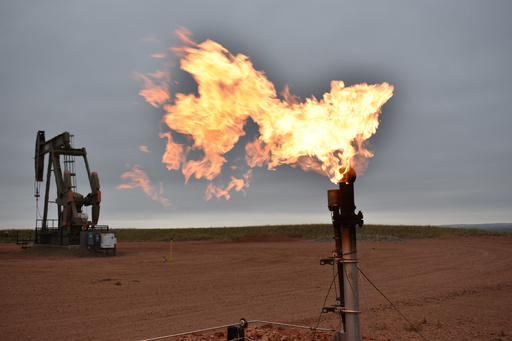WASHINGTON — For the first time, companies involved in oil and natural gas extraction will be required to pay a federal fee if they exceed specified methane emissions levels, as finalized by the Biden administration’s new regulation.
This regulation by the Environmental Protection Agency (EPA) stems from a directive included in the 2022 climate legislation passed by Congress. The aim of introducing the methane fee is to motivate the industry to implement best practices that minimize emissions, thereby potentially avoiding the fee altogether.
Regarded as a potent climate “super pollutant,” methane is significantly more effective than carbon dioxide at trapping heat in the short term and accounts for around one-third of global greenhouse gas emissions. The oil and natural gas sector stands as the most substantial industrial contributor to methane emissions within the United States, leading advocates to assert that reducing these emissions is a vital step in combating climate change.
The announcement of this regulation is expected during an international climate summit in Azerbaijan. This development follows Donald Trump’s recent nomination of former New York congressman Lee Zeldin to lead the EPA in what may be Trump’s second term. If confirmed by the Senate, Zeldin is anticipated to pursue the repeal or relaxation of multiple environmental regulations instituted under President Biden’s administration, particularly with a focus on promoting U.S. “energy dominance.”
Deregulation of the oil and gas sector may include targeting the newly introduced methane fee. According to the EPA’s framework, companies producing excess methane in 2024 will incur a fee of $900 per ton, with expected increases to $1,200 in 2025 and $1,500 by 2026. Industry representatives are likely to contest the rule, especially concerning any attempts to enforce retroactive fees.
Although the regulation will not attain final status until early next year, following its publication in the Federal Register, EPA Administrator Michael Regan remarked in a statement that this rule will complement a previously established EPA regulation focused on methane emissions this year. This initiative targets the U.S. oil and natural gas industry as part of Biden’s broader agenda to address climate change and secure an environmental legacy.
The fee, officially known as the Waste Emissions Charge, is designed to encourage the prompt adoption of existing technologies that can curb methane emissions and other harmful air pollutants. Regan highlighted that this fee represents the latest measures taken under President Biden’s methane strategy, promoting efficiency in the oil and gas sector, safeguarding American jobs, enhancing air quality, and bolstering U.S. leadership internationally.
Previous legal challenges from industry groups and Republican state officials against the earlier methane regulation have failed, including an attempt to have the Supreme Court intervene in the matter while the case is ongoing in lower courts. Critics claim that the EPA has overstepped its boundaries by establishing unrealistic standards through the new rules. However, the EPA maintains that these regulations are within its jurisdiction and are aimed at protecting public health.
Many leading oil and gas firms already meet or surpass the methane performance thresholds set by Congress, suggesting that they will not have to pay the new fee, according to Regan and other officials. Nonetheless, the EPA forecasts that the regulation will lead to the cumulative reduction of 1.2 million metric tons of methane emissions (equivalent to 34 million metric tons of carbon dioxide) by 2035. This reduction is comparable to the clean-air benefits realized by removing nearly 8 million gasoline-powered vehicles from the roads for a year, according to the agency. Overall climate gains could reach up to $2 billion, as estimated by the EPA.
Despite the favorable outlook from environmentalists regarding the impending methane fee, which will hold oil and gas firms accountable for their emissions contributing to climate change, industry lobbyists have voiced strong opposition. The American Petroleum Institute, which is the leading lobbying group for the oil and gas sector, criticized the earlier fee proposal as a “punitive tax increase” that “threatens America’s energy advantage.” They expressed a desire to collaborate with Congress to overturn what they describe as a misguided tax on American energy.
The EPA anticipates that, over time, fewer oil and gas companies will be subjected to this fee as they implement measures to reduce emissions in alignment with the new regulation.
